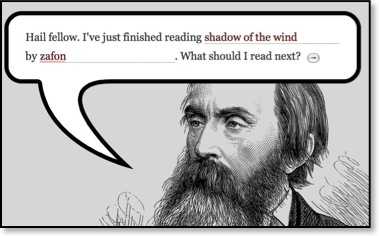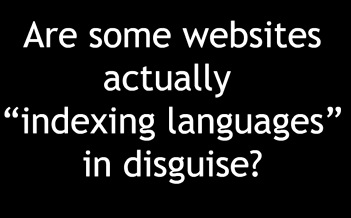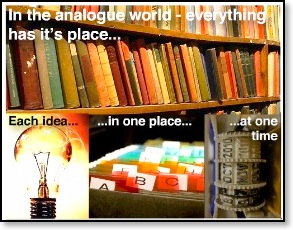Bye bye Vista
Vista, I have to tell you something, and I thought it would be easier to say in a letter. Microsoft's newest operating system is on its way; Windows 7 will be here on October 22. So, I know this is kind of awkward, Vista, but I'm going to have to ask you to get your things ready and start packing up.
Look, I know you'll miss your old hard drive, but this kind of thing happens all the time. I hope you aren't crying. Don't you remember your cousin? Windows ME? He had a tough career too, and now he's got his own Wikipedia page. Retirement is going to look good on you too, Vista. And, remember, Microsoft will be giving you product support for a few more years anyway.
More from Ian Paul. I remember Microsoft Bob, and I even have a notepad with old Bob on it. We have been using it to keep Scrabble scores for a long time.
Don't work yourself too hard
If you rabidly focus on work, in the long run, you'll be unhappy. Ran Kivetz, a professor of business at Columbia University, recently conducted a series of experiments that identified a paradox in our behavior: Doing the "right" thing—putting our responsibilities ahead of momentary pleasures—often leaves us unhappy down the road. When we skip a vacation to work overtime or pass up that awesome vintage Porsche for a used minivan—sure, we pat ourselves on the back for a week or two. But as the years go by, we invariably regret our monkishness and wish we'd enjoyed ourselves more.
The word for this is hyperopia: an excess of farsightedness. In a 2006 study, Kivetz asked respondents to think about a moment from the previous week when they had to choose between work and pleasure; then he asked them to rate how much they regretted their decision. The amount that people regretted either working or relaxing was pretty much equal. But then he asked a second group to think about a similar moment from five years earlier. This time, people's regret over working was more than double the regret over playing.
Free or not free?
By the way, Anderson's book has an index. It is inactive in the kindle edition. I would love to write to him and let him know that for $50, Joshua Tallent could have kindlized it for him.
Jonathan Fields has more about hoping all things won't be free.
Amazon's snatching back books
This is why I hesitate about truly being in the world of cloud computing.... I have seen too many crashes, too many faulty software upgrades, too many things go wrong with just local and network storage. What if the cloud site goes down? What if they upgrade an application, and it is a bad upgrade? Do you lose all your data? What if they decide a certain app is not worthwhile, and they pull it while you sleep? No more data for you?
Jamais Cascio of Fast Company agrees....
You couldn't have spent more than a few seconds online over the past few days and not have heard about Amazon remotely deleting copies of 1984 and Animal Farm from the Kindles of people who had purchased them. It turned out that the publisher selling this Kindle version didn't have US rights (the copyright on the books has expired in most countries, but not in the US), and the current rights holder demanded that Amazon do something about it. Since Amazon is in constant communication with the millions of Kindles out there, they did what any centralized provider of a service could do--they zapped the infringing copies not just from the storefront, but from any Kindle on which they could be found.
Now, the Kindle is not a cloud computing system, but the Amazon-Whispernet-Kindle infrastructure mirrors many cloud features. More importantly, this incident is indicative of what kinds of trouble can emerge when we reframe "content" as "service." As numerous pundits have noted, the physical book analogy would be Amazon breaking into your home and taking away a book you'd purchased (leaving you a refund on your desk, of course). But a Kindle book isn't a physical book--it's a service, one that (as the Kindle license makes clear) you don't really own.
The cloud computing model may be a wonderful system when it works, but it's a nightmare when it fails. And the more people who come to depend upon it, the bigger the nightmare. For an individual, a crashed laptop and a crashed cloud may be initially indistinguishable, but the former only afflicts one person and one point of access to information. If a cloud system locks up--or if a legal decision, change in ownership, or service provider whim alters the rules unilaterally--potentially millions of people will lose access....
For me, a resilient cloud would be one where the data lives simultaneously online and in local storage, and is in a format that can easily be read (and edited) by both cloud software and local applications. Simply put, it's a retreat from thinking of content as a service. This isn't where the computing world is heading, however, and as we've seen in the last few days, we may well be giving up more than we think for cloud convenience.
200 best beach reads!
The Accidental Tourist by Anne Tyler
The Adventures of Huckleberry Finn by Mark Twain
Affinity by Sarah Waters
The Alexandria Quartet by Lawrence Durrell
Alice's Adventures in Wonderland by Lewis Carroll
All the Pretty Horses by Cormac McCarthy
The Amazing Adventures of Kavalier & Clay by Michael Chabon
Angle of Repose by Wallace Stegner
Animal Dreams by Barbara Kingsolver
Anna Karenina by Leo Tolstoy
The Art of Racing in the Rain by Garth Stein
More....
I have read all but Affinity, and the Art of Racing. Angle of Repose is one of my all time favorite books.
I'm hot, so let's bake cookies in the car!

Car-Baked Chocolate Chip Cookies
1 1/2 cups all purpose flour
1/2 tsp baking powder
1/2 tsp baking soda
1/2 tsp salt
1/2 cup butter, soft
1/4 cup brown sugar
1/2 cup sugar
1 large egg
2/3 cup mini chocolate chips
In a small bowl, whisk together flour, baking powder, baking soda and salt.
In a large bowl, cream together butter and sugars. Beat in egg, followed by flour mixture and chocolate chips.
Place dough on a large sheet of wax paper and roll into a log approximately 11-inches long by 2.5-inches wide. Freeze for 2-3 hours, or overnight.
When ready to bake, park your car in the sun on a 100F+ day. Slice cookies into 1/4-inch thick slices and place on parchment-lined baking sheet. Place baking sheet on car dashboard (with protective towel underneath) and bake for 2 1/2-3 hours, until done.
If you have a big dashboard (or a friend with another car), you can do two batches at once, otherwise you can save half of the dough for another day.
Makes about 2 1/2 dozen cookies.
Microsoft Office 2010
The web
has been
abuzz the past few weeks with chatter about
Microsoft’s announcement today at its Worldwide
Partner Conference in New Orleans about the new
version of Microsoft
Office 2010. There’s even a
mini-movie about its debut. Facing potential
challenges from Google’s browser-based Apps
products and its new
Chrome OS, Microsoft has been touting its
three screens strategy, which is the ability for
products to synchronize across the phone, browser,
and desktop, for some time now.
With the release of Office 2010, SharePoint Server
2010 and Visio 2010, we finally see the
implementation of Microsoft Chief Software Architect
Ray
Ozzie’s
mantra. We had the opportunity to see an in-depth
demo of the new suite of products from Microsoft’s
Group Product Manager for Office 2010, Chris Bryant.
Here’s a complete breakdown of all the functionality
that has been added...:
The Move
To The Browser
Most certainly a direct response to Google Apps, Microsoft is rolling out lightweight, FREE, Web browser versions of Word, PowerPoint, Excel and OneNote. All based in the cloud, the web-based versions of these products have fewer features than their desktop cousins but still give users basic tools to edit and change documents.
3,7000 tweet-long novel
Who says 140 characters isn’t enough to say something constructive? Matt Stewart is writing an entire novel that way.
Yes,
Stewart is publishing his entire 480,000 character
book at 130 characters at a time (to leave room for
hashtags and links) on Twitter. To be clear, the
book, called The French
Revolution... is already written. But Stewart and
his agent couldn’t get any publishers to bite, so
they decided to go the non-traditional route, to say
the least.
Here’s
how this works: Every so often, Stewart is tweeting
out sentences (or incomplete sentences) from the
book. No, he’s not doing this by hand, he got a
programmer to help him automate the process. The
result is slowly spilling out the entire narrative of
the book to his Twitter
feed.
If you think this would be impossible to follow in a regular stream of tweets, you’re right. That’s why Stewart has a website chronicling the whole story thus far (or, of course, you can simply click on his Twitter page to read it — though backwards). Stewart expects that will will take about 3,700 tweets to get the full story out there.
What is technology going to do?
Here are some of the things that are coming, I think, from the inevitable drive of technology to order nature, and our human desire to have efficient sorting systems:
We’ll continue to cataloging everything (from books to people to places) online, and find better ways to sort all that information, using objective authority (eg authoritative incoming links, aka google juice), personal network authority (links/preferences from your chosen network) as relevance indicators.
We will map this network on the web, and increasingly apply it to physical space (starting with google maps, and becoming more customized and personalized)
Mobile technology will mean both that our access to cataloged information becomes ubiquitous, and our efforts to catalog things will be unconstrained
RFID, or something like it, will mean that this sorting of physical objects will move from its current general state (eg. tracking & finding something like “any copy of a certain book”), to specific (eg. tracking & finding something like “a particular copy of a certain book”), and will touch people too
We’ll get all the media we want, when we want it
We’ll get most of the data we want, when we want it
Our mobile devices will increasingly interact with our physical surroundings (point at an object, get info on it; buy it; sell it), and will become our bank, and keys, our thermostat, and more, as well as everything else it already is (telephone, email, library, map etc).
All data on the web will become structured, and mostly available
More data sets (eg government-owned) will arrive on the web, and more people will participate in using that data to understand the world, and make decisions, to order nature
Data about people will become structured, and mostly available [For a well-networked human in my circle, this has already happened: I can track their interests, on a daily basis (del.icio.us, google reader shared items, digg etc.), their movements (dopplr), their public thoughts (blogs, twitter), books they like (librarything, gutenberg bookshelf), things they buy, etc etc.]
Lots of money will be made (if all goes well, some of it by friends of mine) finding new and different ways to do all this, and more and more. In essence, we’ll continue to use the web (and increasingly, mobile devices) to better order nature. And we’ll become better ordered at the same time.
Looking at this very brief list of what’s going to happen, I can’t help but think: “so what?” Is any of this going to make people’s lives richer or more meaningful?
My suspicion is “no.” I say this as a digital native, if a relatively recent, adoptive native (starting in 2004). For myself, I have found that the price of the benefits of the web has been heavy: while the web has allowed me to do all sorts of things, to build things and relationships, and projects, I find the quality of my time on the web so often unsatisfying. In a comparison of value to me between a random “leisure” hour on the web and a random hour doing something else in the real world, the real world trumps the web almost every time. Yet the web still usually wins the battle for my time (this says as much about me as it does about the web, of course).
The world's largest thesaurus?
Professor Christian Kay is not one for showing off. 'Scots are quite good at dictionaries,' she says in her gentle but precise Edinburgh accent. 'Pure, grim determination is our thing.'
Quite good? Now that's taking self-deprecation a bit far. For this is the woman who has spent two-thirds of her life on an unrivalled labour of literary love.
After 42 years of toil, this October she will finally publish the mammoth Historical Thesaurus of the Oxford English Dictionary, the biggest thesaurus ever published. It boasts a staggering one million index entries.
Wonderful story! Go and read!
Some folks are feeling good about the publishing industry
Oxford, UK, July 1, 2009 — Sixty percent of professional and scholarly societies believe that the global economic downturn might be a stimulus to introducing efficiencies within their organizations, while 57% think it might provide opportunities for launching new activities or services for their members, according to a new study presented at the Wiley-Blackwell Executive Seminar held at the Royal Society, London, on June 19th 2009.
The study, carried out by Wiley-Blackwell, the leading publisher for professional and scholarly societies, examined the potential impact of the economic downturn on its society publishing partners. Sixty-eight percent characterized the global economic downturn as moderately negative, while 17% stated that it will have minimal negative impact or may even be beneficial.
More...
Bookseer

Wikipedia as controlled vocabulary


